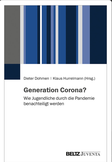What to do after the Easter holidays? - Part 2: Final exams
An overview of the regulatory diversity
In recent weeks, there has been discussion - as there was last year - about whether or not the final examinations should be held as planned. The focus is mostly on the Abitur exams. The Conference of Ministers of Education and Cultural Affairs decided on Thursday (8.4.21) that the final examinations should be held. They are thus due in the coming weeks or months. When exactly depends on how long the school year lasts and how long the summer holidays begin.

Baccalaureate examinations to take place
In a few Länder, the pupils have already passed the Abitur examinations (e.g. Rhineland-Palatinate); in most Länder, the final spurt for the Abitur examinations will begin after the Easter holidays.
In accordance with the decision of the Conference of Ministers of Education and Cultural Affairs, it can be assumed that the Abitur examinations will be held as planned. This follows the procedure of last year, when the examinations took place.
An important argument here is that the Baccalaureate should be comparable with that of earlier as well as later years. However, this is a strange argument in view of the circumstances, and the fact that most Baccalaureate students have had and continue to have only sporadic regular and unrestricted classes since March 2020. In order to give them reasonably fair conditions, there are adjustments in many cases. In some cases, for example, the exam dates are moved back a bit (Baden-Württemberg, Bavaria, Berlin, Bremen, Hamburg, Hesse, NRW, etc.) in order to extend the preparation time, or the exam duration, i.e. the length of the exams, is extended (e.g. Berlin, Bremen, Hamburg, Saxony), teachers have more topics to pre-select, etc. Saxony has apparently not yet made a final determination as to whether or not the exam dates will be postponed. This will depend on the incidence.
Some "facilitations" seem a bit bizarre, such as the requirement that only topics that were actually covered in class should be tested. This should actually be a matter of course.
The examinations always take place in attendance.
Whatever the outcome, all high school graduates or parents should not be irritated by the general hype surrounding the Abitur - it is primarily important for the transition to training or university. For everything that comes after it, it plays at best a subordinate role - and a mediocre Abitur can be made up for by other competencies, skills and experience. These include, of course, in particular completed vocational training or a degree. Only in the civil service is value sometimes still placed on the Abitur certificate and the grade point average.
You can find details of the Abitur examinations in your state at Corona-was-darf-ich. (Corona-what-do-you-call-it).
Examinations for the first and intermediate school-leaving certificate usually take place, but not everywhere
The flexibility is obviously somewhat greater than with the Abitur examinations when it comes to the other school-leaving qualifications, such as the Hauptschul- or Realschul- or first and intermediate school-leaving certificate. Sometimes the first school leaving certificate is also called simple or extended vocational training maturity.
Berlin has already decided that no written examinations need to be written, as has Hamburg in relation to the Berufsbildungsreife and Rhineland-Palatinate. Alternatively or in addition, the examination requirements are reduced, i.e. slightly fewer written examinations,
Brandenburg is also postponing the examinations, as are Baden-Württemberg, Bavaria, Berlin, Bremen, Hamburg, Hesse, North Rhine-Westphalia, Saxony-Anhalt, etc. Often the exams now take place at the end of May or even in June. Saxony has apparently not yet made a final decision.
Furthermore, some also offer special preparation possibilities: for example Hamburg, where there are to be special preparation courses in small groups.
Furthermore, there are to be some simplifications, e.g. fewer written examinations have to be taken. Some "facilitations" seem a bit bizarre, such as the requirement that only topics that were actually covered in class should be tested. This should actually be a matter of course.
The examinations always take place in attendance.
After graduating from school, the transition to training, be it dual or school-based training, is imminent. Although the school-leaving certificates play an important role in the successful transition to training or vocational school, there are various ways to compensate for not-so-great certificates with other competencies. Because the topic of "transition to training" is an important and rather complex one, we will be building a new information page on this topic starting April 15, 2021. This sub-page will exclusively deal with the topic "Transition to education". Therefore, please have a look at the corresponding sub-page from mid-April.
For details on final exams in your state, visit Corona-what-I-do. (Corona-what-do-you-call-it).
Final vocational examinations usually take place
The examinations for the completion of vocational training take place in all Länder, in some cases they are postponed somewhat. For the most part, the same regulations apply as for the other school-leaving qualifications.
It is worth mentioning that Hamburg offers exam colloquia for preparation and teachers are supposed to give concrete advice on the exam topic. There is also a little more time to answer the questions.
The examinations always take place in attendance.
You can find the details of the final exams for vocational training in your state at Corona-what-does-it-me. (Corona-what-do-you-call-it).
Published on
Topics
Articles on the topic
-
How do I find a school place for my child?
Depending on the state and type of school, different things need to be...

-
Childcare - how does it work in Germany?
The path from application to daycare place is simple and complicated at...

-
Controversy: open schools or close schools?
Politicians should react now to slide unprepared into a forced closure....

-
Corona pandemic severely disadvantages children and young people - but there is no "Corona generation"
This is a core finding of the anthology "Generation Corona? How young...

-
Kitas and schools in a state of flux
Update from 9.4.2021 on the current regulations

-
What happens after the Easter holidays?
Part 1 - Kitas and schools: open or closed?
